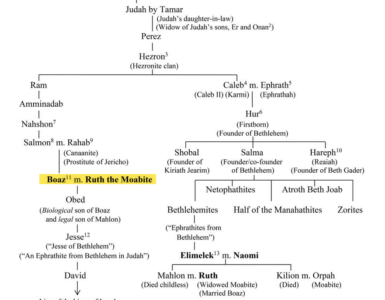 What is the Bible’s blueprint for becoming the kind of person who can deal with all of life’s challenges? What is wisdom and how does a person acquire it? What are the practical steps to pursue in becoming wise? And how is living a life of wisdom similar to becoming a great jazz soloist?
What is the Bible’s blueprint for becoming the kind of person who can deal with all of life’s challenges? What is wisdom and how does a person acquire it? What are the practical steps to pursue in becoming wise? And how is living a life of wisdom similar to becoming a great jazz soloist?
Bible Gateway interviewed Daniel Grothe (@mrdanielgrothe) about his book, Chasing Wisdom: The Lifelong Pursuit of Living Well (Thomas Nelson, 2020).
What do you mean when you say people are wise who know how to handle whatever life throws at them?
Daniel Grothe: Mike Tyson once quipped, “Everyone has a plan until they get punched in the mouth.” Scores of people think they have a coherent and thoughtful approach to life, but we all know that a plan doesn’t mean much of anything when something goes horribly wrong. The unexpected funeral. The sudden loss of a job. Children that have wandered from the faith into the “far country” of their own foolishness. These are the moments that level the playing field of the human experience. Life moves on all of us.
But not all responses to crisis are created equal. Some people are thrown into a tailspin while others seem to possess a deep poise that carries them through. Some people who seemed to have so much promise end up fizzling out while others weather the unexpected storms and live well for the long haul. The question then becomes, How do we become the kind of people who know how to handle whatever life throws at them? How do we learn to navigate the terrain we never expected to traverse? In short—and this is the question at the bleeding heart of this book—how do we become wise?
How is living a life of wisdom similar to becoming a great jazz soloist?
Daniel Grothe: The student of the Old Testament will discover that five books—nearly one-sixth of the Hebrew Scriptures—are categorized under the genre known as wisdom literature. They show us the complexity of the human experience, and function for the believer a bit like how musical scales function for a jazz musician.
I got my first set of drums when I was two years old, and I’ve been playing my whole life. Through the years, I’ve played in several jazz quartets. In a good quartet, the upright bassist and the drummer hold down the rhythm section, usually with a pianist; and to round out the group, a saxophonist, guitarist, or trumpeter will usually step to the front to play all the lead melodic lines and feature on most of the solos. Think John Coltrane on tenor sax. All great jazz musicians have at least three things in common: (1) they’ve gone into the practice room and learned and internalized all the scales, which are simply organized sequences of notes, until they can play them forward and backward; (2) they’ve put in the time to learn all the standard jazz songs (in jazz parlance, they’ve “learned the book”); and (3) they can play every one of those standards in any key.
“Oh, you want me to play Duke Ellington’s ‘Take the A Train’ in C?” No problem!
“How ’bout we play ‘A Night in Tunisia’ in D?” You got it.
“Hey, man, you good with playing Brubeck’s ‘Take Five’ in E-flat minor?” Sure thing.
If these three things are in place—knowing all the scales and all the songs in any key—a great jazz musician can walk into any club, on any night, in any city, and be ready to play.
Living a life of wisdom is a lot like becoming a great jazz soloist. As counter-intuitive as it may seem, we have to practice for spontaneity. We have to do our homework ahead of time, so we’re able to creatively improvise when the moment arises. A life of wisdom is about learning to think on our feet; about learning to be responsive to the actual conditions of life.
What are the books of the Bible that are described as wisdom literature and how do you quickly summarize each one?
Daniel Grothe: The wisdom books are Job, Proverbs, Ecclesiastes, Song of Songs, and some of the Psalms.
The book of Job is a painstaking account of a life that’s fallen apart. But the story is thick with irony as the text describes Job as a righteous man.
If we strictly read the Proverbs, we might be left with the impression that life runs only by a simple moral calculus; that is, a righteous person is always rewarded with a prosperous life, while the wicked suffer harm. However, the story of Job lets us know that things are not always so simple.
The book of Ecclesiastes gives us a glimpse into the mind of a man who realizes life often doesn’t work in the way we thought it would. The Bible, far from being a sanitized or oversimplified account of life in God’s good world, is not afraid to name and address the troubling tensions we all experience on a daily basis.
Solomon’s Song of Songs stirs our passions, broadening the range of emotions appropriate to the human experience, letting us know the world can be experienced as a garden where the Lover and the beloved—God and his people—live in intimate harmony.
The book of Psalms fits us for praise, giving us language adequate to our role as priests in the kingdom of God.
And the book of Proverbs, when read with the long view in mind—with the eschaton in mind—brings us full circle. When God finally makes all things new, the righteous will flourish and look in triumph on their foes.
Who are sages you write about and why did you select them?
Daniel Grothe: I mention a bunch of sages throughout the book—St. Thomas à Kempis, St. Macrina, a Turkish woman from the fourth century who helped raise two of the church’s great theologians, and Rabbi Abraham Joshua Heschel. But Eugene Peterson is the chief sage that features in this book because of the 10-year back-and-forth that I shared with him. He’s the translator of The Message Bible, was a pastor for 30 years before that, and author of some 40 books.
I discovered Eugene’s writing at a critical juncture in my life. After reading a book of his, I wrote him a letter asking if I could visit him for a day of conversation. To my surprise, he responded with an invitation and from there he became one of the most important sages in my life. One of the fun features of this book is that every chapter has a story of an interaction I had with Eugene that challenged me and called me to be more.
What are your thoughts about Bible Gateway and the Bible Gateway App and Bible Audio App?
Daniel Grothe: I use Bible Gateway all the time! Every day I’m logging on to read and enjoy the rich resources available. One of my favorite things to do is listen to the excellent audio recordings of the text. We forget that the Scriptures were originally heard by the saints. So, I often lay on the floor of my study early in the mornings and listen to these ancient texts.
Chasing Wisdom is published by HarperCollins Christian Publishing, Inc., the parent company of Bible Gateway.
Bio: Daniel Grothe is the associate senior pastor at New Life Church in Colorado Springs, Colorado. Daniel and his wife, Lisa, live on a small hobby farm outside of Colorado Springs with their three children: Lillian, Wilson, and Wakley.
Get biblically wise and spiritually fit when you become a member of Bible Gateway Plus. Try it free right now!
The post Living a Life of Wisdom Is Similar to Becoming a Great Jazz Soloist: An Interview with Daniel Grothe appeared first on Bible Gateway Blog.











